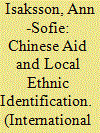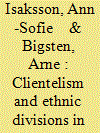| Srl | Item |
| 1 |
ID:
175818


|
|
|
|
|
| Summary/Abstract |
Recent empirical evidence suggests that Chinese development finance may be particularly prone to elite capture and patronage spending. If aid ends up in the pockets of political elites and their ethno-regional networks, this may exacerbate ethnic grievances and contribute to ethnic mobilization. In this research note I examine whether Chinese development projects make local ethnic identities more salient in African partner countries. A new geo-referenced data set on the subnational allocation of Chinese development finance projects to Africa is geographically matched with survey data for 50,520 respondents from eleven African countries. The identification strategy compares sites where a Chinese project was under implementation at the time of the interview to sites where a Chinese project will appear subsequently. The empirical results suggest that living near an ongoing Chinese project makes ethnic identities more salient. There is no indication of an equivalent pattern when considering other donors’ development projects.
|
|
|
|
|
|
|
|
|
|
|
|
|
|
|
|
| 2 |
ID:
156429


|
|
|
|
|
| Summary/Abstract |
This article investigates the commonly assumed link between ethnic divisions and clientelism in African politics by examining the role of contextual ethnic divisions and specific ethnic affiliations in shaping attitudes towards clientelism. The empirical findings, drawing on quantitative data for 38,293 survey respondents across 25 African countries suggest important country heterogeneity, but also highlight some regularities. In particular, the ethnic composition of the population in the area of residence, rather than the individual's own ethnic affiliation, is important in shaping support for clientelism. Individuals living in a region where the majority of the population is the president's co-ethnics tend to be more supportive of clientelism, regardless of their own ethnic affiliation. The wide coverage of the results makes them especially interesting; while a number of studies suggest ethnically based targeted transfers in specific sectors or settings, this study explores the links between different forms of ethnic divisions and support for clientelism in a large multi-country African sample.
|
|
|
|
|
|
|
|
|
|
|
|
|
|
|
|